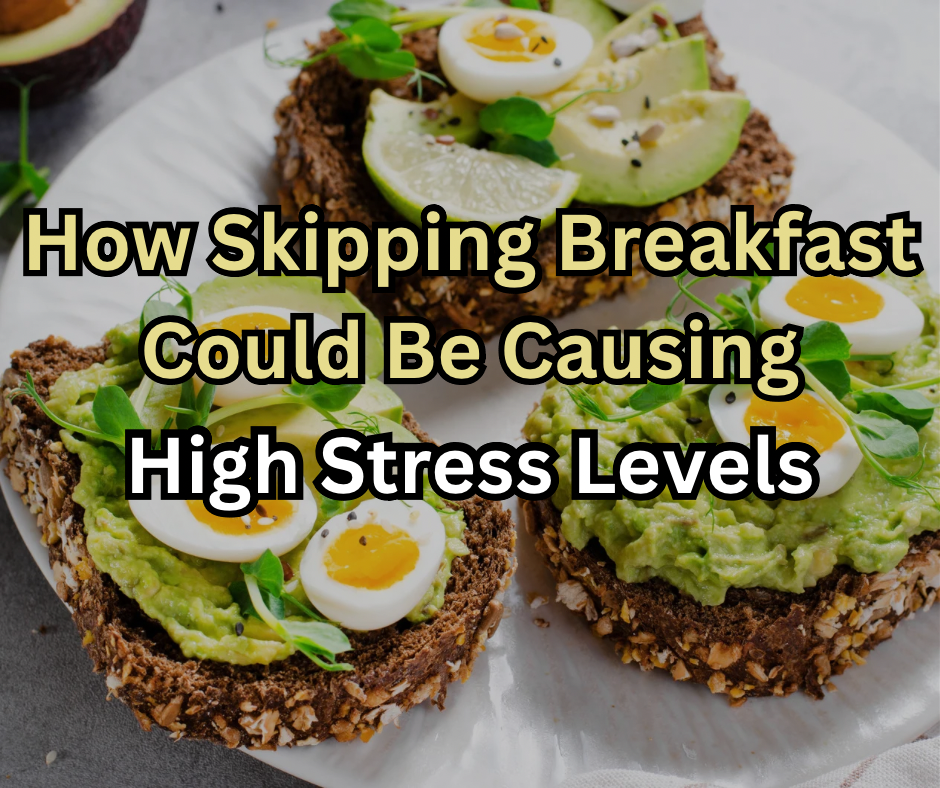Why Skipping Breakfast Could Be Raising Your Stress: How Cortisol Plays a Role
You may already know that skipping meals isn’t ideal, but did you know that skipping breakfast could be making your stress levels worse? It’s true: your body’s natural stress hormone, cortisol, can rise when you skip that all-important morning meal. In this article, we’ll explain how skipping breakfast triggers cortisol production, why this creates more stress, and what you can do to manage it better.
What is Cortisol?
Cortisol is a hormone produced by your adrenal glands in response to stress. It’s often called the “stress hormone” because it helps your body manage situations where you need to react quickly—like in a fight-or-flight response. Cortisol has many other important roles, too: it helps regulate metabolism, control blood sugar, and reduce inflammation. But when cortisol levels stay too high for too long, it can have serious health effects, including weight gain, anxiety, sleep problems, and high blood pressure.
How Cortisol Works:
Think of cortisol like a “first responder” to stress. When your body senses stress, cortisol kicks in to help release energy, raise blood sugar, and keep you alert. However, if your cortisol levels are constantly elevated, your body is in a state of chronic stress, which can cause health issues.
How Skipping Breakfast Makes Cortisol Rise
When you wake up in the morning after fasting overnight, your blood sugar is lower. To help balance it out, your body naturally releases cortisol to raise your blood sugar and give you energy for the day. This is completely normal and part of your body’s natural rhythm. However, when you skip breakfast, this stress response doesn’t get the break it needs.
Why Cortisol Spikes When You Skip Breakfast:
If you don’t eat, your body keeps releasing cortisol to raise your blood sugar levels. But without the fuel from food, cortisol levels stay elevated longer than they should. This can leave you feeling jittery, stressed, and anxious. Over time, the constant spike in cortisol due to skipping breakfast can lead to chronic stress and imbalanced hormones, which might affect your weight, mood, and overall health.
Example:
Let’s say you skip breakfast after a poor night’s sleep. Your body is already under stress from lack of rest, and now, it’s facing another challenge: no food. Your cortisol levels rise to make up for the missing fuel, and you end up feeling more stressed, tired, or anxious than if you had eaten a healthy breakfast.
The Connection Between Cortisol, Stress, and Skipping Breakfast
Skipping breakfast isn’t just a simple habit—it can set off a chain reaction in your body that raises cortisol levels. Higher cortisol leads to more stress, more cravings for sugary foods, and more difficulty managing your emotions and focus. In other words, skipping breakfast can make your body feel like it’s under constant stress, even when you don’t realise it.
The Impact of High Cortisol:
When cortisol remains high due to skipping meals or chronic stress, it can disrupt several aspects of your health:
- Weight Gain: Elevated cortisol encourages fat storage, especially around your midsection.
- Mood Swings & Anxiety: High cortisol levels can make you feel irritable, anxious, or fatigued.
- Sleep Problems: High cortisol at night can interfere with your ability to fall asleep and stay asleep.
- Weakened Immune System: Chronic stress can lower your immunity, making you more vulnerable to illness.
How to Lower Cortisol and Manage Stress Better
- Don’t Skip Breakfast:
Eating breakfast is an important step in managing cortisol. A balanced breakfast with protein, fiber, and healthy fats helps keep your blood sugar steady and prevent that cortisol spike.
For example: Try eggs with avocado and whole-grain toast or a smoothie with protein powder, spinach, and berries. - Practice Stress Management:
If you’re feeling stressed, try simple techniques like meditation, yoga, or deep-breathing exercises. These activities can lower cortisol and help you feel more relaxed.
For example: Try a 10-minute guided meditation each morning to start your day on a calm note. - Get Enough Sleep:
Make sure you get 7-9 hours of sleep per night. Poor sleep raises cortisol levels and makes it harder for your body to manage stress the next day.
For example: Try to go to bed and wake up at the same time every day to regulate your sleep schedule. - Eat Regular, Balanced Meals:
In addition to breakfast, try to avoid skipping other meals during the day. Eating regularly helps to keep cortisol levels balanced and supports energy throughout the day.
For example: Include protein, healthy fats, and complex carbs in each meal to keep your blood sugar steady. - Exercise Regularly:
Physical activity, particularly aerobic exercises like walking, swimming, or cycling, can help lower cortisol and improve overall well-being.
For example: A 30-minute walk after lunch can help keep your cortisol levels in check while providing a natural energy boost.
Skipping breakfast may seem like a harmless habit, but it can trigger a rise in cortisol, leaving you feeling more stressed and potentially affecting your long-term health. By eating a balanced breakfast, managing stress, getting enough sleep, and staying active, you can keep cortisol levels balanced and reduce stress. This will help you feel better, sleep better, and manage your weight more effectively.
Remember, it’s about small changes over time. Starting with a healthy breakfast every day is a simple yet powerful step to help your body handle stress more efficiently and improve your overall well-being.
